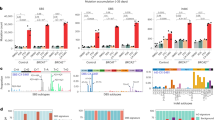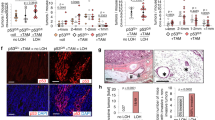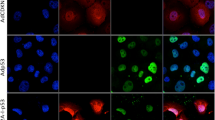Abstract
We have previously shown that p53 disruption sensitizes certain cancer cell types to cisplatin (CDDP) (Fan et al., 1995). In the present study we investigated the role of the p53 downstream effector, p21CIP1/WAF1 (p21), in this sensitization. Studies were performed in human colon cancer HCT-116 cells and murine embryonic fibroblasts (MEF) with intact versus disrupted p21 genes. For comparison, HCT-116 cells lacking p53 function were also prepared through stable transfection with the human papillomavirus type-16 E6 gene. HCT-116/E6 cells were found to be more sensitive than control transfectants to CDDP and another DNA crosslinking agent, nitrogen mustard (HN2). HCT-116 cells with disrupted p21 genes also exhibited greater CDDP and HN2-sensitivity than parental HCT-116 cells. In contrast, the clonogenic survival of HCT-116 cells exposed to ionizing radiation, adriamycin, taxol or vincristine was not affected by p53 or p21 disruption. Sensitization of HCT-116/p21−/− cells to CDDP and HN2 was not limited to the HCT-116 cell background since MEF from p21 knockout mice were also more sensitive to these DNA crosslinking agents. Investigations into a possible cause of this enhanced sensitivity revealed that HCT-116 cells lacking p53 or p21 function exhibited a reduced ability to repair cisplatin-damaged CAT-reporter plasmids transfected into the cells. In addition, we found that HCT-116/p21−/− cells were much more susceptible to HN2-induced cell cycle delay than parental cells. Our results suggest that p21 disruption preferentially sensitizes at least some cell types to DNA crosslinking agents.
This is a preview of subscription content, access via your institution
Access options
Subscribe to this journal
Receive 50 print issues and online access
$259.00 per year
only $5.18 per issue
Buy this article
- Purchase on Springer Link
- Instant access to full article PDF
Prices may be subject to local taxes which are calculated during checkout
Similar content being viewed by others
Author information
Authors and Affiliations
Rights and permissions
About this article
Cite this article
Fan, S., Chang, J., Smith, M. et al. Cells lacking CIP1/WAF1 genes exhibit preferential sensitivity to cisplatin and nitrogen mustard. Oncogene 14, 2127–2136 (1997). https://doi.org/10.1038/sj.onc.1201052
Received:
Revised:
Accepted:
Issue Date:
DOI: https://doi.org/10.1038/sj.onc.1201052
Keywords
This article is cited by
-
Multiple functions of p21 in cancer radiotherapy
Journal of Cancer Research and Clinical Oncology (2021)
-
Silencing of Twist1 sensitizes NSCLC cells to cisplatin via AMPK-activated mTOR inhibition
Cell Death & Disease (2012)
-
Polycomb protein EZH2 regulates cancer cell fate decision in response to DNA damage
Cell Death & Differentiation (2011)



